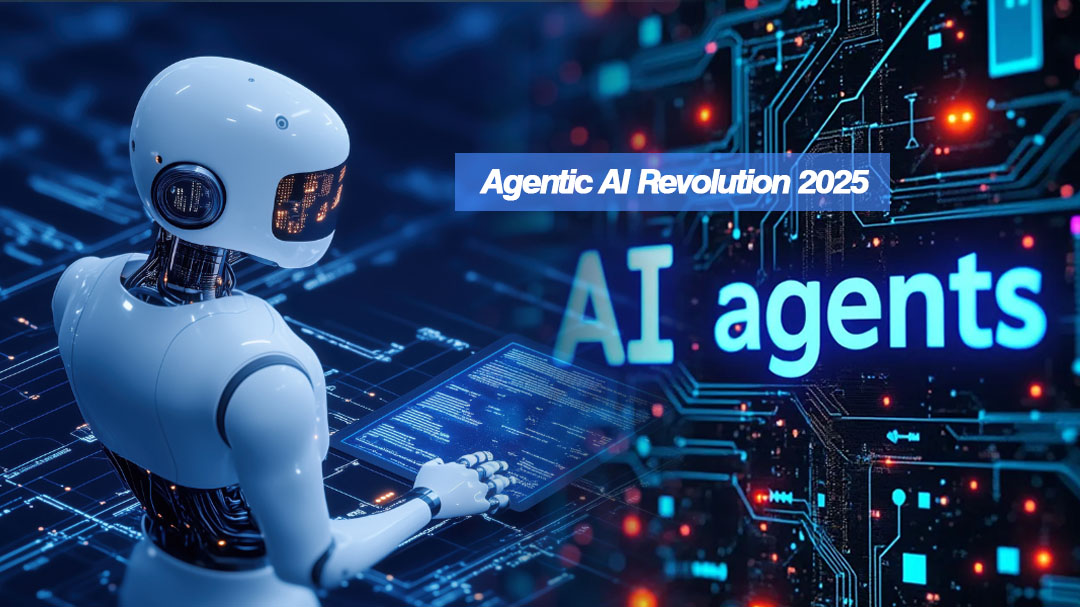Build a Django Discussion Forum: Step-by-Step Tutorial
Learn how to build a complete Django discussion forum with anonymous posting, user interactions, and...
Get instant access to the latest tech news, reviews, and programming tutorials on your device!
🔍 Search Latest International Tech News, Reviews & Programming Tutorials
Learn how to build a complete Django discussion forum with anonymous posting, user interactions, and...
These AI tools offer a range of functionalities to enhance the creative process for vloggers....
NASA astronaut Sunita Williams is returning to Earth with SpaceX’s Crew Dragon, utilizing advanced splashdown...

Discover how Agentic AI is revolutionizing business in 2025. Learn implementation strategies, benefits, and real-world applications of autonomous AI agents that work independently to boost productivity and efficiency.
The artificial intelligence landscape is experiencing a seismic shift in 2025, with agentic AI emerging as the most transformative technology trend. Unlike traditional AI systems that require constant human oversight, autonomous AI agents can independently plan, execute, and adapt their strategies to achieve specific goals. This comprehensive guide explores how Agentic AI is reshaping business operations and why it's become Gartner's top strategic technology trend for 2025.
Agentic AI represents a revolutionary leap beyond conventional artificial intelligence. These sophisticated systems demonstrate autonomous decision-making capabilities, allowing them to operate independently while pursuing defined objectives. Unlike reactive AI tools that simply respond to prompts, agentic AI agents proactively analyze situations, develop strategies, and execute complex workflows without continuous human intervention.
The global AI market is projected to reach $190.61 billion by 2025, with agentic AI driving significant portions of this growth across healthcare, finance, manufacturing, and retail sectors. Organizations implementing comprehensive AI governance platforms are experiencing 40% fewer AI-related ethical incidents compared to those without such systems.
Agentic AI systems excel at understanding high-level objectives and breaking them down into actionable steps. They continuously assess progress and adjust strategies based on real-time feedback and changing conditions.
These intelligent systems can evaluate multiple options, weigh consequences, and make informed decisions without human intervention. This capability makes them invaluable for time-sensitive business operations.
Autonomous AI agents learn from each interaction, continuously improving their performance and expanding their capabilities through experience and data analysis.
Modern agentic AI systems can operate across various business functions simultaneously, from customer service and logistics to drug discovery and financial analysis.
Leading manufacturers are deploying autonomous AI agents to optimize production schedules, predict equipment failures, and coordinate supply chain logistics. These systems analyze massive datasets in real-time, enabling proactive maintenance and reducing downtime by up to 35%.
Intelligent AI agents are revolutionizing customer support by handling complex inquiries, escalating issues appropriately, and learning from each interaction to improve future responses. Companies report 60% faster resolution times and improved customer satisfaction scores.
In healthcare, agentic AI accelerates drug discovery by analyzing vast molecular databases, identifying promising compounds, and predicting potential side effects. This autonomous approach is reducing research timelines from years to months.
Financial institutions leverage autonomous AI agents for fraud detection, risk assessment, and algorithmic trading. These systems continuously monitor market conditions and execute trades based on sophisticated analytical models.
Begin by identifying specific business processes that would benefit from autonomous operation. Conduct thorough assessments of data quality, infrastructure requirements, and potential ROI scenarios.
Start with small-scale pilot programs focusing on well-defined use cases. This approach allows organizations to test capabilities, refine processes, and build internal expertise before scaling.
Gradually expand successful pilot programs across departments while maintaining robust governance frameworks. Ensure proper integration with existing systems and workflows.
Implement ongoing monitoring and optimization processes to maximize the value of autonomous AI agents. Regular performance reviews and system updates are essential for long-term success.
As autonomous AI agents become more prevalent, AI governance platforms are becoming essential for managing ethical, legal, and operational risks. These comprehensive systems create, manage, and enforce policies for responsible AI use while providing transparency and accountability.
Key governance features include:
Successful agentic AI deployment requires high-quality, well-structured data. Organizations must invest in data cleansing, standardization, and integration processes to ensure optimal performance.
The autonomous AI revolution demands new skill sets across organizations. Companies are investing heavily in training programs and hiring specialists to bridge the knowledge gap.
Autonomous systems require robust security frameworks to protect sensitive data and prevent unauthorized access. Implementing zero-trust architectures and advanced encryption is crucial.
Successful adoption requires comprehensive change management strategies that address employee concerns and facilitate smooth transitions to AI-augmented workflows.
Industry experts predict that by 2028, 80% of humans will engage with smart autonomous systems daily, representing a massive increase from Less than 10% today. This transformation will fundamentally reshape how businesses operate and compete.
Emerging developments include:
Organizations ready to embrace autonomous AI should focus on:
The Agentic AI revolution represents more than just technological advancement; it's a fundamental shift toward intelligent, autonomous business operations. Organizations that successfully implement autonomous AI agents will gain significant competitive advantages through improved efficiency, reduced costs, and enhanced decision-making capabilities.
As we progress through 2025, the question isn't whether businesses should adopt agentic AI, but how quickly they can implement these transformative systems while maintaining ethical standards and operational excellence. The future belongs to organizations that can effectively harness the power of autonomous artificial intelligence.
The time for preparation is now. Companies that begin their agentic AI journey today will be best positioned to thrive in an increasingly automated and intelligent business landscape.
About the Author:This article was researched and written by tech industry experts specializing in AI implementation and business transformation strategies.
Comments & Discussion